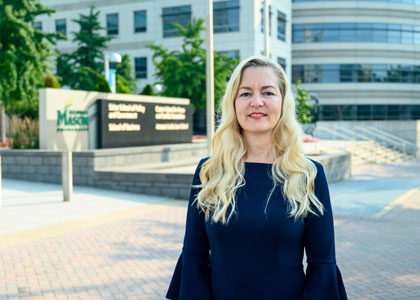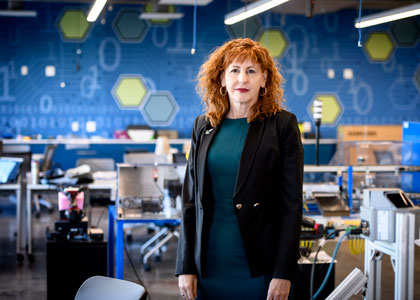Tech support
George Mason aims to produce nearly 16,000 high-tech workers
M.J. McAteer //July 30, 2021//
Tech support
George Mason aims to produce nearly 16,000 high-tech workers
M.J. McAteer //July 30, 2021//
In summer 2025, George Mason University is scheduled to open a distinctive, $168 million, 360,500-square-foot glass-and-steel tower on its Virginia Square campus in Arlington. Inside its walls, the university’s commitment to innovation, entrepreneurship and the creation of a tech-savvy workforce will be on full display.
In its 60-odd years of existence, Mason’s unwavering fealty to changing and growing with the times has transformed it from a startup branch of the University of Virginia with 17 students who studied at a renovated elementary school into Virginia’s largest public institute of higher learning, with more than 39,000 students.
Mason is a “different model of an educational institution,” says Joseph DeFilippo, director of academic affairs and planning for the State Council of Higher Education for Virginia. In just 20 years, he says, Mason has added close to 200 degree programs, far more than any other Virginia state college or university. In what might be taken as an understatement, he explains that statistic by saying that Mason has “a lower threshold for trying new things.”
The school’s latest “new things” are typical of Mason’s ambitious character — not just the new building that is going up on the Arlington campus, but also the just-created College of Engineering and Computing that it will house. The core of this college — no surprise, this being Mason — is brand-new, too: GMU’s School of Computing. The school will focus on statistics, computer science and information technology, subjects formerly under the purview of the Volgenau School of Engineering. As part of the university’s redesign and expansion of its science and technology programs, it is folding Volgenau into the College of Engineering and Computing.
All of these changes are, in huge part, the result of the state’s $1 billion Tech Talent Investment Program (TTIP). The program’s creation was a major part of Virginia’s successful campaign to entice Amazon.com Inc. into locating its multibillion-dollar HQ2 East Coast headquarters in Arlington.
The program’s purpose is to produce 31,000 additional computer science and engineering graduates during the next two decades to feed the enormous demand for skilled workers from Amazon and the many other tech companies clustered in Northern Virginia.
The commonwealth now has the third-highest concentration of technology companies in the nation but, like other tech-centric areas in the country, it doesn’t have enough skilled workers to fill the ranks. The U.S. Bureau of Labor Statistics has predicted that the nation will need more than 500,000 new workers in the fields of computer science and IT by the end of this decade.
Eleven universities statewide are participating in TTIP, but Virginia Tech and Mason are the biggest recipients of the initiative’s state funding. Tech is in line for $545 million to aid development of its $1 billion Innovation Campus in Alexandria, close to Amazon HQ2, and Mason is getting $235 million,
$86 million of which it will spend on construction of the Virginia Square building. The rest of the construction costs will be funded through philanthropy.

In return for Virginia’s $235 million investment, Mason has pledged to graduate at least 15,948 bachelor’s and master’s degree holders in computer science and related fields.
The state’s investment on such a grand scale will have “a very positive impact” on the creation of a diverse digital workforce, says Virginia Economic Development Partnership President and CEO Stephen Moret, adding that Northern Virginia has the potential to become a national leader in data science.
‘Beacon of innovation’
Liza Wilson Durant is a professor of engineering at the Volgenau School. She also is an associate dean for strategic initiatives and community engagement. In that role, she has been overseeing much of the programmatic aspects of the Virginia Square building project.
In addition to housing the new college, the building will be home to the Institute of Digital InnovAtion, still another new enterprise that Mason opened last year. More than 300 Mason faculty, research staff and students will work at the institute to develop technologies and systems in fields as diverse as finance, health and social justice. Durant says that areas of special study at the institute will include cybersecurity for transportation, manufacturing and supply chains and, given GMU’s location just a few miles from the Pentagon, national defense.
She envisions the institute, which will include innovation labs, business incubators and co-working facilities, as “a beacon of innovation” with a big role to play in creating an equally enterprising innovation district along the Rosslyn-Ballston corridor. The corridor already has a hefty head start on that goal, containing offices for tech giants such as Oracle and Amazon Web Services, Fortune 500 companies such as Mastercard and government contractors like Northrop Grumman Corp., not to mention several dozen other companies, large and small, established and startups.
The hoped-for product of all this commingling between “gown and town” is an ecosystem of wraparound services that Durant says will produce a competitive edge for the region and speed the transfer of research achievements to the marketplace while simultaneously offering advanced technical training to students.
Supporting all these efforts at the institute will be yet another new Mason institution — the College of Computing’s Department of Cyber Security Engineering. The first of its kind in the country, the department was launched March 1 and will focus on various areas of cybersecurity in various industries in areas including cellular networks, autonomous vehicles and the Internet of Things.
Paula Sorrell, Mason’s associate vice president of innovation and economic development, also is at work on Mason’s multifaceted efforts to boost its synergy with the surrounding community and to make sure the region can make the most of the technologically skilled workers that the university is committed to producing. In fiscal 2020, Sorrell says, Mason supported 10,000 companies, offering 863 training and educational programs that served 18,000 attendees.
Sorrell also oversees myriad business outreach efforts that include:
The GMU Office of Technology Transfer, which helps faculty and students protect their research and bring it to market. Sorrell says it has seen 53% growth in the past five years and recently doubled its staff.
The Virginia headquarters for 28 Small Business Development Centers that the federal Small Business Administration has established statewide.
The Procurement Technical Assistance Center, which provides low-cost or free assistance to enterprises that want to do business with local, state and federal entities.
The Innovation Commercialization Assistance Program, through which experienced entrepreneurs offer free help to tech startups. Mason administers the state program for the commonwealth.
Incubators slated for the new Virginia Square building, along with incubators in Leesburg, Fairfax, Springfield and

Warrenton that operate through the Mason Enterprise Center, all of which remained open throughout the pandemic. “It’s unusual to run this many incubators,” Sorrell says, noting that the oldest one at Mason dates to 1995.
Diversity and inclusion
These multipronged initiatives aimed at ensuring that the region has the necessary skilled tech workers for a prosperous future also come with a resolute commitment to inclusivity. “It’s part of our DNA,” Durant says. “We want to support companies that look like our students.”
To that end, in fiscal 2020 Mason provided support services to more than 50 companies run by minorities.
Mason, in partnership with Marymount University, also recently ran a cybersecurity internship program for the Commonwealth Cyber Initiative NoVa Node. Starting with 16 paid intern positions, it will expand by 40 more internships this fall. About 70% of the interns accepted for the program so far have been women and people of color.
Mason’s student population is about 47% minority, along with international and multiethnic students. Many of these students are the first in their families to go to college, and many work while they earn their degrees.
“These students are not coming from a deficit. They don’t need help, but access to information,” says Chris Carr, chief diversity officer at Volgenau School of Engineering.
That Mason is successful in finding many ways to provide that information is borne out by its graduation statistics. “Mason has no equity gaps,” DeFilippo in academic affairs says. Minority and majority students graduate at identical rates.
Diversity does not start and end just with students, of course. Developing a diverse technological workforce is also about faculty, so Mason is directing some of its state TTIP funding into a program called the TTIP Faculty Thematic Hiring Initiative. The initiative, spearheaded by Carr and Sanmay Das, a professor of computer science, is creating four faculty positions that will support multidisciplinary education and research in computing fields. The first position will focus on biomedicine and health care disparities and the second on the intersection of artificial intelligence and social justice, with the focus of the other two positions still to be determined.
Many engineers and tech scientists may think that their work has little to do with larger issues, but the emergence of technological innovations such as algorithms to track personal data can affect everything from child welfare priorities to who gets a mortgage or access to medical procedures. “This is not a technocratic exercise,” Das says. “It affects society.”
That assessment, of course, can be applied to Mason itself. As the university continues to grow by leaps and bounds, it will be using its innovative and technological expertise, its business acumen and its belief in multiculturalism not only to supply Northern Virginia with a modern workforce but also to reshape the face of the region itself.
At a glance
Founded
Originally formed in 1949 as an extension of the University of Virginia, George Mason University formally separated from U.Va. in 1972.
Campus
Mason’s main campus is located on 677 acres in Fairfax County, just south of Fairfax city and about 20 miles outside Washington, D.C. Mason’s Arlington Campus, located in the county’s urban Clarendon business district, is home to the Antonin Scalia Law School and the Schar School of Policy and Government. The university also has the Mason Korea campus in Songdo, South Korea, and the Smithsonian-Mason School of Conservation campus in Front Royal.
Enrollment
38,542 (fall 2020)
Student profile
Female: 52%
Male: 47%
In-state: 81%
Minority: 47%
Academic programs
In 2020-21, Mason offered 210 total degree programs, including 78 undergraduate degree programs, 94 master’s degree programs, 38 doctoral degree programs and one First Professional Juris Doctorate program.
Faculty
GMU has 1,612 full-time instructional and research faculty.
Tuition, fees, housing and dining
In-state tuition and fees: $13,014
Out-of-state tuition and fees: $36,474
Room and board: $12,090
C

















